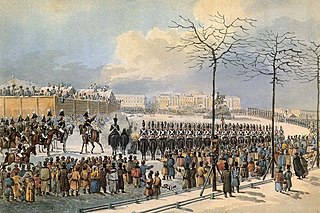 W
WThe Decembrist revolt or the Decembrist uprising took place in Imperial Russia on 26 December [O.S. 14 December] 1825. Russian army officers led about 3,000 soldiers in a protest against Tsar Nicholas I's assumption of the throne the day before, as his elder brother Constantine had removed himself from the line of succession. Because these events occurred in December, the rebels were called the Decembrists.
 W
WMikhail Pavlovich Bestuzhev-Ryumin was a Russian officer, one of the organizers of the Decembrist revolt. He was the youngest of the five hanged Decembrists.
 W
WAlexander Alexandrovich Bestuzhev (Russian: Алекса́ндр Алекса́ндрович Бесту́жев, IPA: [bʲɪˈstuʐɨf] ;, was a Russian writer and Decembrist. After the Decembrist revolt he was sent into exile to Caucasus where Russian Empire was waging the war against the Circassians. There writing under the pseudonym Marlinsky he became known as a romantic poet, short story writer and novelist. He was killed there in a skirmish.
 W
WNikolay Alexandrovich Bestuzhev (Russian: Николай Александрович Бестужев; was a Russian Navy officer, writer, inventor and portrait artist; associated with the Decembrist revolt.
 W
WPyotr or Petr Yakovlevich Chaadayev was a Russian philosopher. He was one of the Russian Schellingians.
 W
WThe Chernigov Regiment revolt was the second and the last major armed conflict of the Decembrist revolt in the former Russian Empire. The revolt unfolded January 10 [O.S. December 29] – January 15 [O.S. January 3] 1826 in Ukraine between Kiev and Bila Tserkva.
 W
WFor our freedom and yours (Polish: Za naszą i waszą wolność) is one of the unofficial mottos of Poland. It is commonly associated with the times when Polish soldiers, exiled from the partitioned Poland, fought in various independence movements all over the world. First seen during a patriotic demonstration to commemorate the Decembrists, held in Warsaw on January 25, 18311, it was most probably authored by Joachim Lelewel. The initial banner has the inscription in both Polish and Russian, and was meant to underline that the victory of Decembrists would also have meant liberty for Poland. The slogan got shorter with time; the original had the form 'In the name of God, for our freedom and yours' ('W imię Boga za Naszą i Waszą Wolność'). The original banner has been preserved in the collection of Muzeum Wojska Polskiego in Warsaw.
 W
WFyodor Nikolaevich Glinka was a Russian poet and author.
 W
WKonstantin Gustavovich Igelström Russian Decembrist from the noble Swedish family of Igelström.
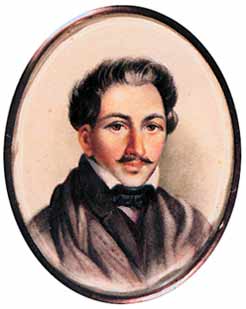 W
WPyotr Grigoryevich Kakhovsky was a Russian Imperial officer and active participant of Decembrist revolt, known for the murder of General Mikhail Miloradovich and Colonel Ludwig Niklaus von Stürler.
 W
WWilhelm Ludwig von Küchelbecker was a Russian-German Romantic poet and Decembrist.
 W
WIulian Liublinskii was a Polish born noble who later became a Slav nationalist and Decembrist. Prosecuted for his part in the Decembrist uprising he was jailed, and later exiled.
 W
WMikhail Sergeyevich Lunin, also spelt Mikhaïl Lounine, was a Russian political philosopher, revolutionary, Mason, Decembrist, a Lieutenant of the Grodno Life Guards regiment and a participant of the Franco-Russian Patriotic War of 1812. After a successful career in the military during the Napoleonic invasion, he became involved with multiple liberal Russian secret societies in the early 19th century, including the Union of Salvation and the Union of Welfare, as well as the Northern Society and the Southern Society. After the Decembrist Revolt took place in 1825, he was arrested due to his affiliations with the men responsible, and was subsequently exiled to a labor camp in Siberia. Lunin spent time in Finnish jails, three different prisons in Siberia, and lived on a farm under the watchful eye of the government during his life as an exile. Known for keeping good spirits and maintaining a firm defiance of autocratic rule, Lunin was eventually imprisoned again for writing in "opposition" to the Russian government, and lived out the rest of his life in a cell.
 W
WSergey Ivanovich Muravyov-Apostol was a Russian Imperial Lieutenant Colonel and one of the organizers of the Decembrist revolt.
 W
WNikita Mikhailovich Muravyov was an Imperial Guards staff officer and plotter in what led to the Decembrist revolt of 1825.
 W
WPrince Yevgeny Petrovich Obolensky was a Russian officer from the Obolensky family, one of the most active participants in the Decembrist revolt.
 W
WAlexander Ivanovich Odoevsky was a Russian poet and playwright, one of the leading figures of the 1825 Decembrist revolt. One of Odoevsky's lines, "Iz iskry vozgoritsa plamya", has come down in history as a long-lasting slogan of the Russian revolutionary movement. It was chosen as a motto for the Lenin-founded newspaper Iskra, also giving the magazine its title, which means "spark".
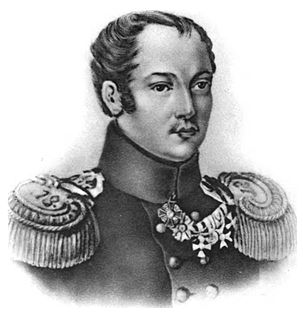 W
WColonel Pavel Ivanovich Pestel was a Russian revolutionary and ideologue of the Decembrists.
 W
WIvan Ivanovich Pushchin ; 4 (15) May 1798, Moscow – 3 (15) April 1859, the estate Marino, Bronnitsy district of Moscow Governorate, buried in Bronnitsy, near the city's cathedral) was a Decembrist, Collegiate assessor and poet.
 W
WThe Russian interregnum of 1825 began December 1 [O.S. November 19] with the death of Alexander I in Taganrog and lasted until the accession of Nicholas I and the suppression of the Decembrist revolt on December 26 [O.S. December 14]. In 1823 Alexander secretly removed his brother Constantine from the order of succession, after Constantine informed Alexander he had no intention of ruling the Empire, and appointed Nicholas heir presumptive. This unprecedented secrecy backfired with a dynastic crisis that placed the whole House of Romanov at peril. Only three men, apart from Alexander himself, were fully aware of his decision, and none of them was present in the Winter Palace when the news of Alexander's death reached Saint Petersburg on December 9 [O.S. November 27] 1825.
 W
WKondraty Fyodorovich Ryleyev, also spelled Kondraty Feodorovich Ryleev was a Russian poet, publisher, and a leader of the Decembrist Revolt, which attempted to overthrow the Russian monarchy in 1825.
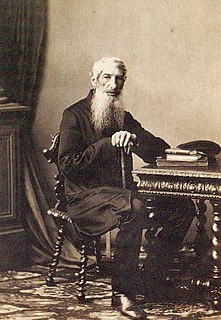 W
WPrince Sergei Petrovich Trubetskoy was one of the organizers of the Decembrist movement. Close to Nikita Mikhailovich Muravyov in his views, he was declared the group's leader on the eve of the December 26 uprising in 1825 but failed to appear, and instead sought refuge in the Austrian embassy.
 W
WNikolay Ivanovich Turgenev, was an early Russian Imperial economist and political theoretician who gained renown for his Essay on the Theory of Taxation (1818) and Russia and the Russians (1847). A relative of the novelist Ivan Turgenev, Nikolay co-founded several reformist societies, notably the Northern Society of the Decembrists. Being abroad during the fateful Rebellion of 1825, he chose never to return to his homeland, where he was tried in absentia and sentenced to Siberian katorga for life.
 W
WThe Union of Salvation, formed in 1816, also known as the Society of True and Loyal Sons of the Fatherland since 1817, was the first secret political society of the Decembrists.
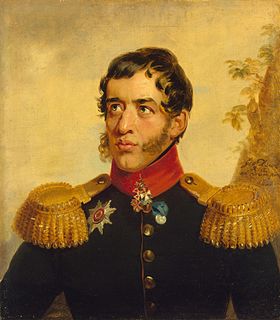 W
WPrince Sergei Grigorievich Volkonsky was a Russian Major General and Decembrist from the aristocratic Volkonsky family.
 W
WAleksey Petrovich Yermolov was a Russian Imperial general of the 19th century who commanded Russian troops in the Caucasian War. He served in all the Russian campaigns against the French, except for the 1799 campaigns of Alexander Suvorov in northern Italy and Switzerland. During this time he was accused of conspiracy against Paul I and sentenced to exile. Two years later he was pardoned and brought back into service by Alexander I. Yermolov distinguished himself during the Napoleonic Wars at the Battles of Austerlitz, Eylau, Borodino, Kulm, and Paris. Afterwards he led the Russian conquest of the Caucasus.